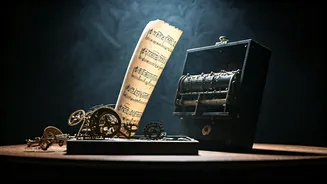Copyright Infringement
The heart of the matter lies in the German court's determination that OpenAI had overstepped legal boundaries. The specific infringement involved the use
of song lyrics, a form of copyrighted material, in the training of its AI models. This action was found to be in violation of existing copyright laws, raising fundamental questions about the balance between technological advancement and the protection of intellectual property rights. The court's decision underscores the necessity for developers to carefully consider copyright implications during the creation of AI systems and the need for stricter regulations governing the usage of copyrighted content.
Impact on AI Training
This legal decision has far-reaching consequences for how AI models are trained globally. The court’s verdict indicates that developers must obtain proper licenses or permissions when utilizing copyrighted material, like song lyrics, for the development of AI. This ruling could force AI companies to rethink their data acquisition strategies, potentially leading to increased costs or limited access to diverse training data. Such limitations may influence the type and range of outputs these AI models can generate, potentially reshaping how various industries harness AI in the future. Furthermore, it underlines the importance of transparency in data usage and the need for ethical guidelines in AI development.
Broader Legal Implications
The court's ruling is more than just a specific case against OpenAI; it has broader implications for copyright law in the era of rapidly advancing AI. This could prompt a reconsideration of existing copyright frameworks to incorporate AI-specific concerns. It might drive lawmakers to create new legislation or update existing ones, which will define the boundaries of how copyrighted materials can be used in AI training. Furthermore, the decision might serve as a landmark case to clarify the roles and responsibilities of AI developers, content creators, and copyright holders. This will inevitably influence how digital content is created, distributed, and protected in the future.
OpenAI's Response
The repercussions of this ruling will necessitate OpenAI’s response and adaptations. The company will likely need to re-evaluate how it obtains training data and how it ensures compliance with copyright laws. Options could range from securing licenses for copyrighted works to adapting training methods to use only permissible content. OpenAI’s approach in addressing this ruling will set a precedent for other AI companies. Public statements, legal challenges, or collaborations with copyright holders will shape the legal environment for AI development. Ultimately, their reaction will influence industry practices and public trust.
The Future Outlook
Looking forward, the legal landscape surrounding AI and copyright will continue to evolve. This German court decision is a sign of increasing scrutiny over AI practices and the growing importance of intellectual property rights. The industry is probably headed towards more complex legal disputes and the development of new precedents. This event will likely accelerate the conversation on AI governance, copyright reform, and ethical guidelines for AI development, leading to a new era of legal and ethical considerations in the field. Consequently, stakeholders across the tech industry, legal sectors, and creative communities need to actively engage with these issues to guide a responsible and sustainable path for AI.













